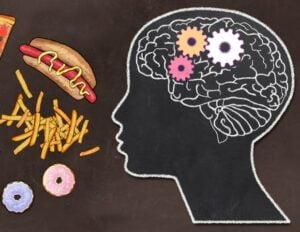Do you have a secret eating habit that may be a sign of an eating disorder? Diagnosing an eating disorder can be difficult without any outward signs, but there are some habits most people would not want to admit. This blog post will outline some of the more common signs that may indicate chances of an eating disorder.
Contents
What Is An Eating Disorder?

Eating disorders are defined as any eating behavior that is harmful to an individual’s physical and mental health. These behaviors can be sustained for months or even years, causing serious damage to one’s body over time.
Types Of Eating Disorders
There are three main types of eating disorders: anorexia nervosa, bulimia nervosa, and binge-eating disorder.
Anorexia Nervosa
- People with anorexia nervosa disorder make themselves eat less than they need to. This may be done by making excuses not to eat or using lots of chewing gum, mints, and mouthwash in order to hide the smell of food on their breath when eating around other people.
- They often only drink liquids (such as water) and don’t always go out for meals at family gatherings and social events like birthday parties and weddings because it is difficult for them to cover up that they are not eating.
- An individual might also: Go hungry and not eat breakfast. Then they can’t control themselves later in the day when they feel hungry. They cut back on what they eat so that they are eating less than what is recommended for their age and size. They weigh themselves frequently to make sure that they haven’t gained any weight, vomit after eating, or use laxatives or diuretics (water pills) to lose weight.
Symptoms Of Anorexia Nervosa Eating Disorder
People with anorexia nervosa have a distorted body image and see themselves as overweight, even when they are dangerously thin.
Some common symptoms of anorexia nervosa include:

- Refusing to eat
- Excessive weight loss
- Obsession with calories and food
- Severe stomach cramps and/or constipation from not eating enough fiber
- Denial of the seriousness of the illness
- Behaving like one is already overweight, even when very underweight
- Frequent checking in the mirror for perceived flaws in appearance
Risk Factors Of Anorexia Nervosa
Certain risk factors may increase the likelihood of an individual developing anorexia nervosa. Some of these include:
1. Being female: Women are more likely to develop anorexia nervosa than men.
2. Having a history of dieting or weight concerns: Individuals who have a history of dieting or those who are highly preoccupied with their weight and shape may be at a higher risk for developing anorexia nervosa.
3. Having a history of physical or sexual abuse: There is evidence to suggest that individuals with histories of physical or sexual abuse resulting in trauma may be more likely to develop eating disorders, including anorexia nervosa.
4. Engaging in activities associated with weight loss: Certain activities, such as ballet and modeling, may contribute to an increased risk of developing anorexia nervosa. These activities involve an intense focus on specific body types that are often underweight and/or result in severe calorie restriction at times of peak physical exertion.
5. Having a family history of eating disorders: Individuals who have a family history of eating disorders are more likely to develop anorexia nervosa.
6. Having certain personality traits: Individuals with a perfectionist or obsessive-compulsive personality traits may be at a higher risk for developing anorexia nervosa.
7. Being diagnosed with another mental health condition: Individuals with a history of depression, anxiety disorders, obsessive-compulsive disorder (OCD), attention deficit hyperactivity disorder (ADHD), or autism spectrum disorders may be at a higher risk for developing anorexia nervosa.
Bulimia Nervosa
- Bulimia nervosa is an eating disorder characterized by bingeing and purging. Bingeing refers to eating a large amount of food in a short period of time and purging means getting rid of the food through vomiting, laxative abuse, or excessive exercise.
- People with bulimia nervosa may have a hard time controlling their eating and feel like they can’t stop binging even if they want to. They may also feel ashamed or embarrassed about their behavior. Purging makes them feel like they’re taking back control over their body and weight.
- People with bulimia nervosa often try to hide their eating habits from others. They might eat in secret or sneak food when no one is looking. Some people even force themselves to vomit after eating, which can be very dangerous.
Symptoms Of Bulimia Nervosa Eating Disorder
Bulimia nervosa is a serious mental illness that can lead to dangerous health problems if left untreated.
Some common symptoms of bulimia nervosa include:

- Recurrent episodes of binge eating, which is eating an excessive amount of food in a short period of time
- Purging behaviors, such as vomiting or using laxatives, to get rid of the food after bingeing
- Excessive dieting and weight control measures
- Frequent feelings of guilt, shame, or disgust about eating behavior
- Low self-esteem
- Feeling out of control around food
- Anxiety and depression
Risk Factors Of Bulimia Nervosa
There are a variety of factors that can increase someone’s risk for developing bulimia nervosa. Some of these include:
- Having a family history of eating disorders
- Experiencing body dissatisfaction or low self-esteem
- Participating in dieting and weight control behaviors
- Having anxiety or depression
- Performing excessive exercise
- Using laxatives, diet pills, or other purging behaviors
If you are experiencing any of these risk factors, it is important to seek professional help. Early diagnosis and treatment can improve the chances of a successful recovery.
Binge Eating
- Binge eating disorder is when you can’t stop eating and feel out of control. It’s different than overeating, which happens occasionally during celebrations or holidays.
- With binge eating disorder, this type of unhealthy behavior goes on for months. People with the condition usually eat large quantities at once even though they don’t want to or try not to eat that much food in one sitting.
- People who have it often hide their binges by claiming they just ate a lot because the food was there, They may also lie about how long ago they last ate something so no one notices what time it really is between meals (or snacks). Consequently, this way people with the condition can eat without anyone knowing.
Symptoms Of Binge Eating
People with binge eating disorders often have compulsive overeating and feel like they cannot control how much food they eat, even when they are full or not hungry.
Some common symptoms of BED include:

- Eating unusually large amounts of food in short periods of time (often within a two hour period)
- Having feelings like you did not plan on eating the amount you ate, but were unable to stop once started
- Eating faster than normal during binges
- Feeling ashamed after an episode of bingeing and attempting to “undo” it such as by purging or fasting afterward
- Frequently dieting between episodes of bingeing
- Eating when not hungry, even if full
- Experiencing feelings of depression or guilt after binge eating.
Risk Factors Of Binge Eating
Binge eating can have a number of serious consequences, both physical and psychological.
- Physically, binge eating can lead to weight gain and obesity, which can increase the risk of developing a range of health problems, such as heart disease, type 2 diabetes, and cancer.
- Psychologically, binge eating can lead to feelings of guilt, shame, and self-hatred. It can also cause problems in relationships and impair work or school performance.
Conclusion
Eating disorders are a serious medical condition that can have severe consequences. The symptoms of an eating disorder may include rapid weight loss, obsessive thoughts about food and body shape, feverish activity to control calorie intake or purge calories after overeating, excessive exercising or laxative abuse. If you suspect that you or someone close to you has one of these conditions please contact your doctor for treatment options.
If you are looking for affordable Online Counseling MantraCare can help: Book a trial therapy session


